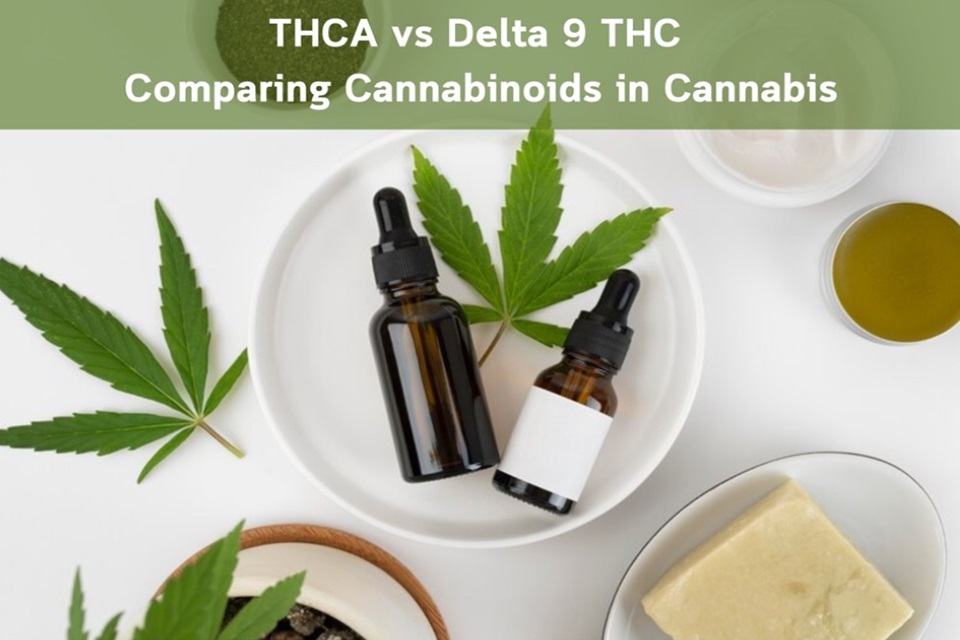
As cannabis consumption becomes more widespread, it’s crucial to understand the differences between various cannabinoids. THCA (Tetrahydrocannabinolic Acid) and Delta 9 THC (Delta-9-Tetrahydrocannabinol) are two key compounds that often come up in discussions. Both play significant roles in the cannabis plant, but they differ in their properties, effects, and uses. This article delves into the differences between THCA and Delta 9 THC, helping you make informed decisions based on your needs and preferences.
What Is THCA?
THCA, known as Tetrahydrocannabinolic Acid, is a non-psychoactive cannabinoid found in raw and live cannabis plants. It’s the precursor to Delta 9 THC and doesn’t produce the “high” associated with THC consumption. Here are some key aspects of THCA:
- Chemical Structure: THCA is the acidic form of THC and has a carboxyl group attached to its structure, making it non-psychoactive.
- Sources: Found in raw cannabis plants. Commonly extracted from fresh, undried cannabis.
- Benefits: It is known for potential therapeutic benefits, including anti-inflammatory, neuroprotective, antiemetic (reducing nausea), and anti-proliferative (inhibiting cancer cell growth) properties.
- Consumption: Consumed in its raw form through juicing or in dietary supplements. It can also be applied topically or used in tinctures.
- Decarboxylation: When heated (through smoking, vaping, or cooking), THCA loses its carboxyl group and converts to Delta 9 THC, becoming psychoactive.
What Is Delta 9 THC?
Delta 9 THC, or Delta-9-Tetrahydrocannabinol, is the primary psychoactive compound in cannabis, responsible for the “high” experienced by users. Here are some essential points about Delta 9 THC:
- Chemical Structure: Delta 9 THC is the decarboxylated form of THCA, with the carboxyl group removed, allowing it to interact with the body’s endocannabinoid system.
- Sources: Found in cured and heated cannabis products such as flowers, edibles, oils, and concentrates.
- Effects: Produces psychoactive effects like euphoria, altered perception, and relaxation. It can also have therapeutic benefits, including pain relief, appetite stimulation, and anti-nausea properties.
- Consumption: Commonly consumed by smoking, vaping, or ingesting edibles. It can also be used in tinctures and topical products.
- Legal Status: The legality of Delta 9 THC varies by jurisdiction. In some places, it’s legal for both medical and recreational use, while in others, it’s strictly regulated or prohibited.
Key Difference Between THCA & Delta 9 THC
Understanding the differences between THCA and Delta 9 THC is crucial for both medical and recreational cannabis users. Here’s a breakdown of the key distinctions:
| Aspect | THCA | Delta 9 THC |
| Psychoactivity | Non-psychoactive. Does not produce a high. | Psychoactive. Produces the high associated with cannabis use. |
| Chemical Composition | Contains an extra carboxyl group. Converts to Delta 9 THC when heated. | The decarboxylated, active form of THCA. |
| Medical Benefits | Potential benefits include anti-inflammatory, neuroprotective, and anti-emetic properties. More research is needed to fully understand its therapeutic potential. | Known for pain relief, appetite stimulation, and anti-nausea effects. Widely studied for its medical applications. |
| Consumption Methods | Consumed raw, in dietary supplements, or topical applications. | Consumed through smoking, vaping, edibles, tinctures, and topicals. |
| Legal Status | Generally less regulated than Delta 9 THC, but its conversion to THC can be subject to legal scrutiny. | Highly regulated, with legal status varying widely depending on location. |
Conclusion
Understanding the differences between THCA and Delta 9 THC is essential for anyone interested in cannabis, whether for medical or recreational use. THCA offers potential therapeutic benefits without the psychoactive effects, making it suitable for those looking for medicinal properties without the high. Delta 9 THC, on the other hand, is well-known for its psychoactive effects and established medical uses.
By recognizing these distinctions, consumers can make informed choices about which cannabinoid best suits their needs and preferences. Whether you’re exploring cannabis for its medicinal benefits or recreational enjoyment, knowledge about THCA and Delta 9 THC is a valuable tool in navigating the diverse world of cannabis.
FAQs
- What are the main differences between THCA and Delta 9 THC?
THCA is non-psychoactive and does not produce a high, whereas Delta 9 THC is psychoactive and responsible for the high. THCA contains an extra carboxyl group, which is removed when heated, converting it into Delta 9 THC.
- Can THCA be used for medical purposes without causing psychoactive effects?
Yes, THCA can be used for medical purposes without causing psychoactive effects. It offers potential benefits like anti-inflammatory and neuroprotective properties and is consumed raw, in supplements, or topically.
- How does the legal status of THCA and Delta 9 THC differ?
THCA is generally less regulated, but its conversion to THC can be legally scrutinized. Delta 9 THC is highly regulated, with legality varying widely by location, being legal in some places for medical and recreational use and prohibited in others.





